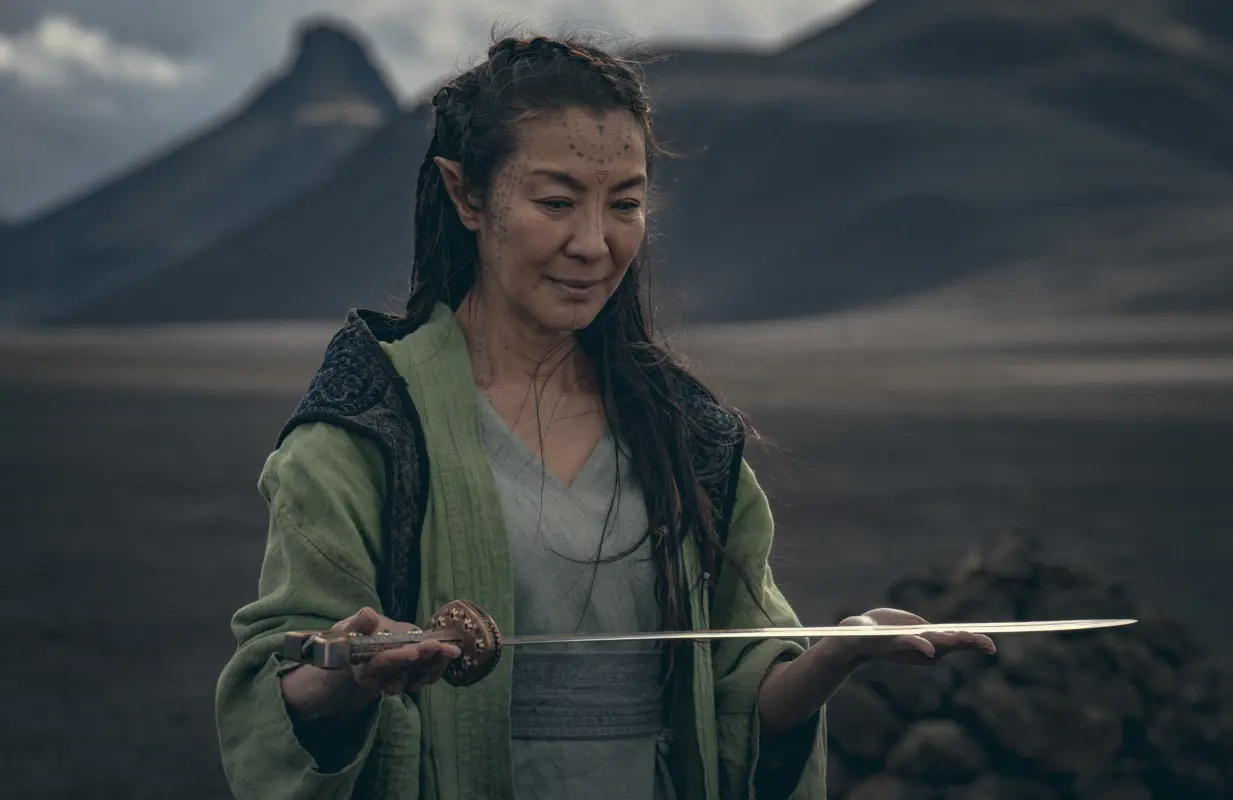The Witcher: Blood Origin Ends The Streak of Great Prequels
-
 Michelle Yeoh in The Witcher: Blood Origin (Photo: Lilja Jonsdottir/Netflix)
Michelle Yeoh in The Witcher: Blood Origin (Photo: Lilja Jonsdottir/Netflix)Spraying as much gore as a medieval chicken, Netflix’s The Witcher: Blood Origin is a prequel series designed to expand the dark-fantasy universe of The Witcher. Pity that the tale is so derivative, held back by the standard beats (and beatdowns) of the post-Games of Thrones sword-and-sorcery genre. In an era of excellent prequels, it proves how wrong these brand extensions can go.
A four-part limited series, Blood Origin is set many centuries before its parent series, the R-rated adaptation of the Polish books and their video game spin-offs. Debuting in 2019 on Netflix, The Witcher follows an itinerant Witcher, or monster hunter, imbued with supernatural powers. After two seasons of that show’s lusty, joke-cracking eye candy, the new story details how the first Witcher came to be during a world-changing event called the Conjunction of the Spheres.
The plot follows seven outcasts who band together to fight the rogue, power-hungry mage Balor (The Rings of Power’s Lenny Henry) as he plots to take over the Continent, as this realm is called. Blood Origin bets everything on viewers’s hunger for redemption in its lead characters — elven warrior turned bard Éile (Sophia Brown) of the Raven Clan and steely elven man-slab Fjall (Laurence O'Fuarain) of the Dog Clan. The disparate, “getting the band together” motions play like a version of Marvel’s Avengers, minus any carefully rendered emotional arcs. That’s a step down from the first Witcher, which enjoys more time and space to orient viewers, build character backstories, and flesh out the narrative of the books and games. (It’s also been renewed for two more seasons.)
By contrast, the Blood Origin scripts try to do too much in their limited runtime, throwing out warriors and conflicts in great heaps. This avalanche of information blurs the conflict, with only vague attempts made to explain far-flung locations and wars in medias res. To confuse things even more, a wide-eyed princess named Merwyn (Mirren Mack) spends time sitting in her windy bedroom, reading about military sieges that happened 1,500 years ago. Yes, this prequel, already set 1,200 years before the original, opens by looking even further back in time.
At least the wonderful Michelle Yeoh plays a small but crucial role as the swordmaster Scian of Ghost Tribe, and the actors do their committed best with a mechanical story. The rusty plot turns are audible from an ocean away, as when mafia-like betrayals shatter a fragile attempt at peace, or when characters who start out trying to kill each other hastily become each other's life-or-death protectors, again and again.
Those last-minute reprieves highlight that, despite its blood-oaths and mounds of bodies, the series struggles to find stakes. There’s no real suspense as the heroes plow through elite soldiers and other obstacles like jelly donuts, with digitally added blood, nauseating squelching sounds, and junior-high profanity added for good measure. And if a hero is hurt, the wound is never fatal.
These limitations are even more noticeable because the show arrives at a moment when many beloved fantasy properties are expanding their source material with prequels and sequels. Top-notch series like Andor and House of the Dragon succeed not only as entertainment, but also as assurances that great human problems have been defeated in the past and will be defeated again. They offer an opportunity to feel better about our own real, uncertain present. While Blood Origin gestures at these themes, it’s hard to feel inspired by a show that does so little with the tools provided by its predecessor.
The Witcher: Blood Origin premieres December 25 on Netflix. Join the discussion about the show in our forums.
John Wenzel is an arts reporter and critic for The Denver Post who has written for Rolling Stone, Esquire, The Atlantic and Vulture. He grew up in Dayton, Ohio, worshipping Guided by Voices and The Breeders, and has a hobbit garden in his front yard.
TOPICS: The Witcher: Blood Origin, Netflix, Laurence O'Fuarain, Mirren Mack, Sophia Brown